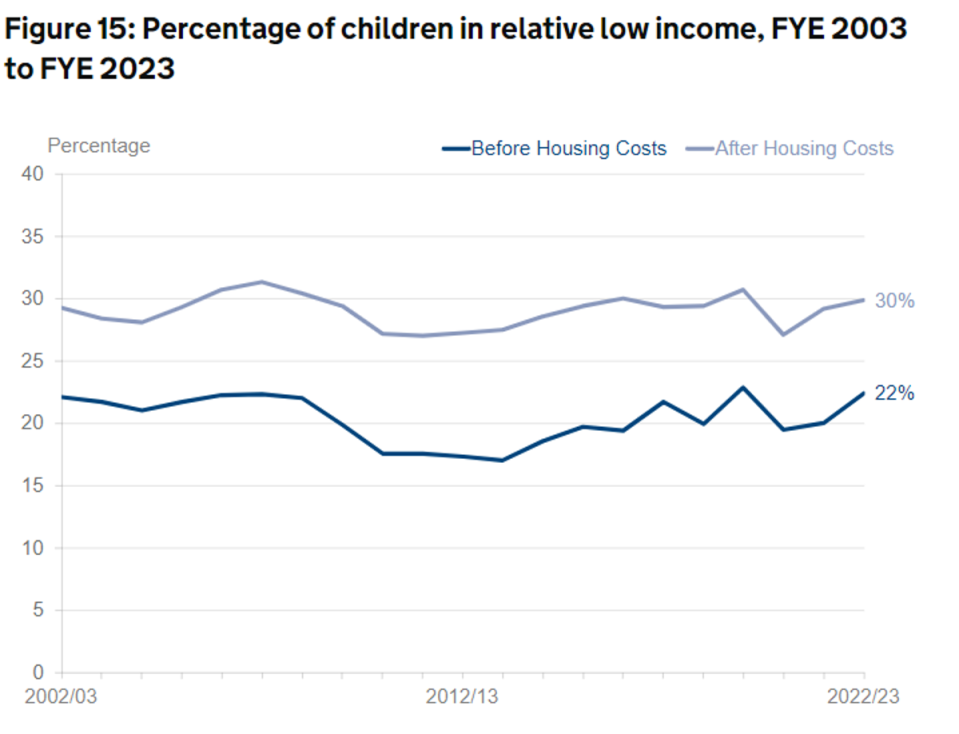Number of children in poverty hits 20-year high, damning figures show
The number of children living in poverty is at a record high, according to damning news statistics that highlight the devastating impact of the cost-of-living crisis on everyday Britons.
Some 4.3 million children are growing up in poverty in the UK, surpassing the previous high of 4.28 million in the year to March 2020 and marking the highest level since records began over 20 years ago.
Campaigners said the “shocking” statistics should act as a wake-up call, with the Joseph Rowntree Foundation accusing the government of failing to protect the most vulnerable people in Britian.
The same data, released by the Department for Work and Pensions, paints a bleak picture across the nation, which the average household income falling in the past year by 1.5 per cent. Income inequality is also widening.

CEO of children’s charity Barnardo’s Lynn Perry added: “Child poverty is on the rise again. The government needs to urgently focus on reducing child poverty.”
Meghan Meek-O’Connor, senior child poverty policy adviser at Save the Children UK, said: “These shocking figures should be an urgent wake-up call to all of us, especially the UK government. We cannot go on like this. There is no reason children should be going without food, heating, toys, or beds.”
Labour MP John McDonnell said: “This set of statistics is truly shocking. There has to be an acknowledgement across the political spectrum of the scale of human suffering this level of poverty inflicts on people and the need for serious action to address this.”
Downing Street said it recognised the difficulties of recent years following the publication of the latest figures on poverty.
The primer minister’s official spokesperson said: “We do recognise that the last few years have been tough and the aftershocks of Covid and the war in Ukraine have driven up the cost of living, driven up inflation.
“Obviously it’s important to look at those statistics in that context. The release today covers that period between April 2022 and April last year, during which inflation did average 10 per cent and energy bills had obviously increased.”
Analysis of the figures by think tank the New Economic Foundation found that levels of child poverty had risen 5.6 times faster in the most deprived areas since 2014/15 compared to the richest.
19 of the 20 local authorities in the UK that saw the highest increase in child poverty were in the North West, East Midlands and West Midlands.
In some major cities, such as Birmingham, over 40 per cent of children under the age of 16 were in relative low income families. 40.6 per cent of children were in this position in Leicester, 40 per cent in Nottingham and 39.4 per cent in Manchester, according to the government data.
A household is considered to be in relative poverty if it is below 60 per cent of the median income after housing costs.
The statistics, released on Thursday, also show a significant increase in the share of pensioners in deprivation in the year 2022/23.
Eight per cent of pensioners in the UK are recorded as in material deprivation, meaning they were surviving without some of the basic essentials needed to live. This was up two per cent compared with 2020 figures, and estimated to be at the highest level since 2016.
This was the first recorded increase in deprivation amongst pensioners since 2014.
The estimated total number of people in relative low income was at 14.35 million in the year to March 2023, down from 14.40 million the previous year, according to the official figures.
Work and Pensions Secretary Mel Stride said the government had “stepped in with the biggest cost-of-living package in Europe, worth an average of £3,800 per household”, which he said has “prevented 1.3 million people from falling into poverty in 2022/23”.
He added: “Our decisive action to more than halve inflation has allowed us to deliver tax cuts worth an average £900 a year - putting more money directly in the pockets of hardworking families.
“On top of this, we’re bringing in the biggest ever rise to the National Living Wage, so more people can achieve long-term financial security through work.
“We’re also going further in April, by uprating benefits and pensions to support millions of people on the lowest incomes and extending the Household Support Fund to provide vital support for those most in need.
“The plan is working, and we need to stick to it to deliver a brighter future and economic security for everyone.”


